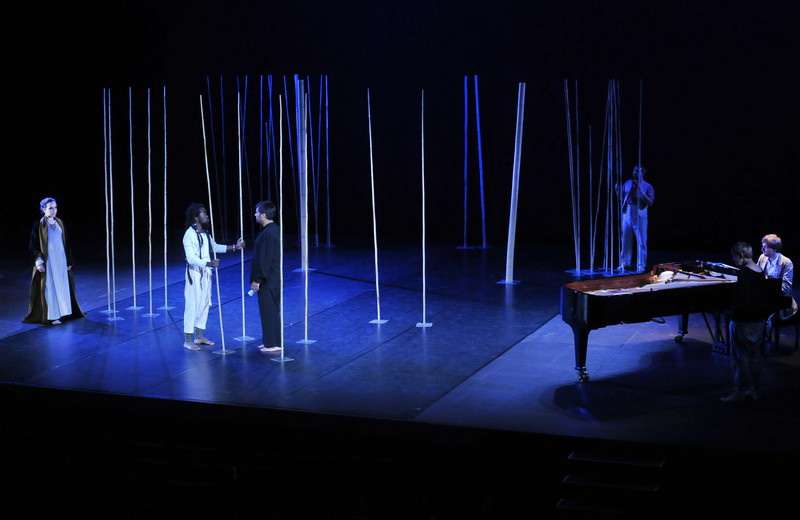|
Back
Peter Brook’s A Magic Flute Opens New Summer Festival in Quebec City Québec
Salle Octave-Crémazie, Grand Théâtre de Québec
07/25/2011 - & July 26*, 28, 29, 2011
Peter Brook, Frank Krawczyk, Marie-Hélène Estienne: A Magic Flute, adapted from W. A. Mozart's Die Zauberflöte, K. 620
Antonio Figueroa (Tamino), Agnieszka Slawinska (Pamina), Leila Benhamza (Queen of the Night), Betsabée Haas (Papagena), Virgile Frannais (Papageno), Patrick Bolleire (Sarastro), Jean-Christophe Born (Monostatos), Abdou Ouologuem (Actor)
Frank Krawczyk (Piano)
Peter Brook (direction), Philippe Vialatte (lighting)
Co-production of the Centre International de Créations Théâtrales/Théâtre des Bouffes du Nord (Paris)

(© Louise Lablanc/Courtesy of QOF)
Opéra de Québec (in Quebec City) inaugurated this past Monday its very first summer festival (Québec Opera Festival). It runs for about two weeks and has a wide range of activities for the novice to the seasoned operagoer. The artistic director, Grégoire Legendre, hopes to make the festival a continuing summer event. On the second night of the festival I attended the Canadian première of Peter Brook’s much talked about 90-minute piano reduction of Mozart’s A Magic Flute. It was freely adapted by the celebrated British director Peter Brook with his collaborators Kranck Krawczyk and Marie-Hélène Estienne, and was mounted in the smaller, more intimate hall (Le salle Octave-Crémazie) of the Grand Théâtre de Québec.
Piano reductions have positive and negative aspects. By reducing complex productions to their essential elements they can become a mere précis or “Cole’s Notes” version—easier for newcomers and young people perhaps to grasp; but lacking orchestration, and the often glorious sets and costumes to which the seasoned operagoer is accustomed, it can come across at times as dry and arid. In this case it just didn’t carry us away.
This week’s production was more or less successful in what it set out to do. The stage was bare except for several dozen bamboo stalks serving as props, and the piano at stage left. The lighting (Philippe Vialatte) was minimal and the piano (Frank Krawczyk) subtle and unobtrusive but appropriate to the action. Singing was in the original German (with French surtitles) but the recitatives were done in French (and at times in Québecois slang such as the common expletive “Tabarnak”!). The young voices were fresh, in most cases earnest, and were adequate to fill the hall of about 700 seats. Standouts were Virgile Frannais (Papageno) with his rich, sonorous baritone; Patrick Bolleire (Sarastro), a true basso profundo; and Agnieszka Slawinska (Pamina) whose clear, sweet soprano was a wonderful match for Pagageno in their duets (during which the chemistry between them was palpable); and finally, Leila Benhamza (Queen of the Night), whose high, ringing soprano, without a hint of vibrato, was a pure delight. Montreal-born Antonio Figueroa (Tamino) was in fine voice but was unconvincing in his devotion to Pamina.
Abdou Ouologuem, a multi-talented artist from Mali, assumed the roles normally played by the three ladies and three boys. With his exuberance, confidence, and ability to dazzle he practically stole the show.
There were a few weak moments in the production. The most egregious example was Papageno’s long-drawn-out attempt to be saved from hanging. And instead of the final glorious chorus the opera ended with a few timid notes on the piano.
Nonetheless the audience loved it, and I may have been the only spoiled sport not to give the production a standing ovation.
The Québec Opera Festival
Opéra de Québec
Earl Arthur Love
|